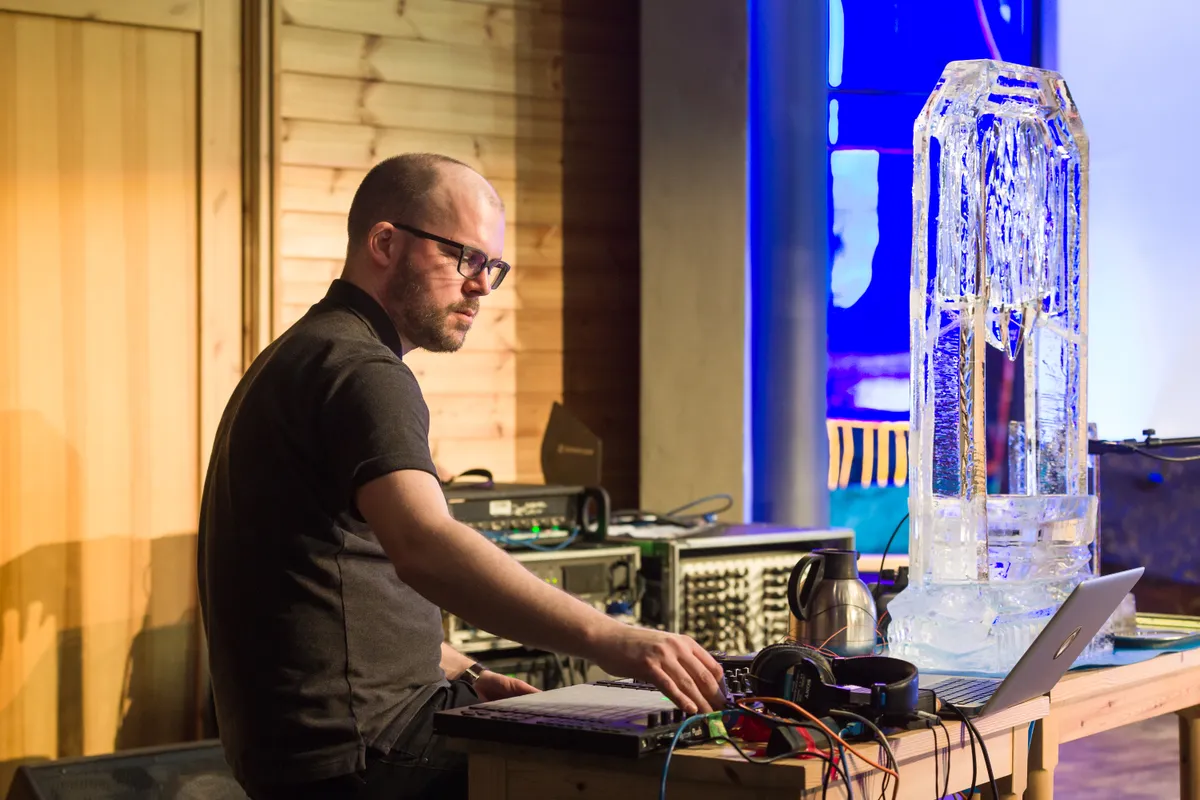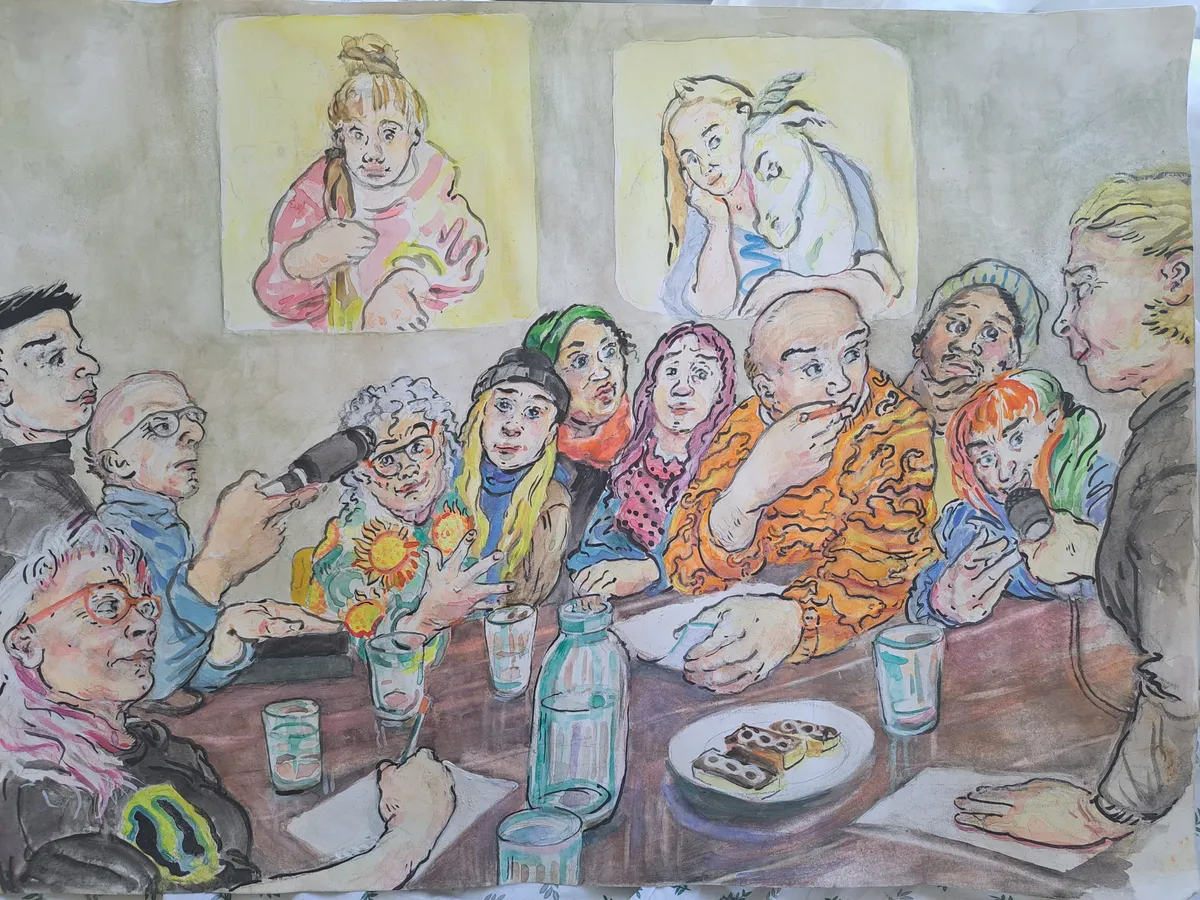Ahead of Mental Health Awareness Week (15-21 May), composer Gawain Hewitt and BBC Radio 3 researcher-in-residence Sally Marlow feature in a special programme on Radio 3, presenting the musical results of their workshops with people with mental health issues.
Here are some reflections from Sally Marlow on the workshop sessions, where she and Gawain helped participants to create music that reflected all the emotions involved in mental illness.
For the past nine months I’ve been the first researcher-in-residence at BBC Radio 3, alongside my more usual day job as Professor of Practice in the Public Understanding of Mental Health Research at King’s College London.
The aim of the residency was to build on my existing work examining relationships between music, the arts, mental health and mental illness, looking at these in new ways. One of the resulting projects was Scoring Mental Health, a programme for Radio 3’s Between the Ears slot.
The idea for the programme started with questioning how mental health and mental illness are portrayed musically. When you strip away lyrics, and think purely of instrumental music associated with mental illness, what’s the first thing that comes into your head?
For many of us it will be films - the high pitched strings of the shower scene in Psycho, for instance. Or The Shining, featuring Bartók’s otherworldly Music for Strings, Percussion and Celesta?
Or something more nuanced – the melancholic piano and muted discord of Mychael Danna’s score for Girl Interrupted? Or James Horner’s orchestral soundtrack for A Beautiful Mind, ranging from mournful to uplifting? Some of us might think of music by composers who were known to have mental illness – Beethoven, Rachmaninov or Berlioz perhaps.
- A guide to Beethoven's Heiligenstadt Testament and what drove him to write it
- Ivor Gurney: how the composer's life was plagued by mental illness
Whatever piece of music we think of, the chances are that it was composed primarily for reasons other than to represent mental illness. Film scores for films about mental health are generally intended to evoke some sort of emotional response in the listener (usually fear). And the great composers wrote for themselves, their audiences and their patrons within the confines of what was acceptable at the time.
We rarely, if ever, hear music composed by people (i.e. non-composers) with mental illness, whose express intention is to create a musical representation of their mental ill health, and its many facets.
Yet we know music can convey feelings which can’t be articulated, and one of the things people with severe mental illness often say is that they don’t have words to convey their experiences to others. Could music bridge that gap, and be a language to communicate aspects of mental ill health like distress, disconnectedness, monotony and lack of control?
An idea was hatched to bring together people with lived experience of mental illness and a composer, to see if something meaningful could be co-composed, with funding for the project provided by the Economic and Social Research Council.
This wasn’t a project for just any composer, it had to be someone who understood how to work with people with lived experience of mental ill health. This included working with those who were severely unwell: it was important for the music to represent the full range of mental health.
I approached composer and sound artist Gawain Hewitt, whom I’d observed previously in the Bethlem and Maudsley Hospital Schools on a City of London Sinfonia project called Sound Young Minds. This is an award-winning music making programme for children and young people under the care of psychiatric hospitals. I’d seen Gawain run workshops for these young people, and knew his practice was respectful and inclusive, resulting in some beautiful music.
We sketched out what to do to make it happen, starting with a focus group to ask people with lived experience of mental illness what sorts of things any new compositions should consider. This would be followed by a series of music making workshops, in which those people would return, along with others, and work with Gawain to make music, all of which would be recorded.

Gawain would then take those recordings and use them as a basis to compose new music. Rather than having pre-determined ideas about format, the music would be informed by the process.
I presented the idea to Rami Tzabar, Creative Director of Audio at TellTale Industries, and along with producer Adrian Washbourne, we worked up a proposal for Matthew Dodd, Radio 3’s speech commissioner. He liked it. Scoring Mental Health was born, and Adrian started the process of capturing audio to record the process as well as the final music.
The focus group was hosted by one of the research groups I work with, the Centre for Society and Mental Health, and around 20 people came in person and online, including people whose illnesses meant they joined us from their bedrooms, or came straight from the hospital wards, accompanied by a member of their care team. They gave us a really clear steer as to what we should include – and, armed with this, Gawain devised his music making workshops.
The magic at those sessions was palpable. We held two at King’s College London, one online, and a particularly lively one in conjunction with the Mental Fight Club at St James Garlickhythe in the City of London, nicknamed 'Wren's lantern' after its architect and owing to its profusion of windows. The symbolism was not lost on us.
Gawain brought with him musical instruments including percussion and a one-stringed cello made from an old banister. Plus, lest you think the process was purely low-fi, a variety of electronic devices loaded with music making apps he’d written himself.
Participants in the workshops brought themselves, and their instruments if they had any and wished to do so (although no prior music making experience was necessary). Some brought anything they liked the sound of – a kitchen whisk was corralled into action, and the groaning of a lift outside the room became something of a leitmotif throughout two of the workshops.
The results are extraordinary. There is the music itself of course – Gawain crafted something beautiful, poignant, moving, and above all, authentic to people’s experiences.

The programme for Between the Ears was masterfully captured, produced and edited by Adrian, and mixed by his colleague Giles Aspen. I am incredibly proud to have been part of something so unique which audiences can now share.
The process, too, was a privilege, and if evidence were needed that music can communicate where words can not, that is apparent not only in the final pieces, but also present in the workshops and the process. As Mental Health Awareness Week begins, I can’t think of a better way to prepare for it than to listen to this programme.
Composer and producer Gawain Hewitt adds: 'The only way I could make this work with integrity was to try and still myself and listen throughout the process. To listen while people told me in words what they wanted to say. To make a safe space for everyone to make sound and music and listen to what they made. And to let the recordings lead my process of composition and music production.
'The result was a joy and a privilege – the work they made was surprising and honest, and as I made sense of what had been captured and put it all together the music revealed itself.'
Between the Ears: Scoring Mental Health is broadcast on Sunday 14 May 2023 (6.45-7.15pm) on BBC Radio 3 and BBC Sounds – part of BBC Radio 3’s special programming linked to Mental Health Awareness Week
Composing alongside Gawain were Michelle Baharier, Stephanie Bates, Lavinia Black, Rashima Black, Rick Burgess, Cruella Dot, Daisy, James Downs, Dorothy Dunn, Cameron Durdy, Tania Gergel, Barrington Gordon, Nicky Heinen, Sarah Hill, Cassie Lovelock, Tiffany Pitts, Sonia Thompson, and members of the Mental Fight Club.
Accompanied by Matt Maguire, sub principal viola, City of London Sinfonia
Illustration of focus group by Stephanie Bates